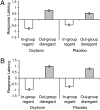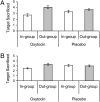Oxytocin promotes human ethnocentrism
- PMID: 21220339
- PMCID: PMC3029708
- DOI: 10.1073/pnas.1015316108
Oxytocin promotes human ethnocentrism
Abstract
Human ethnocentrism--the tendency to view one's group as centrally important and superior to other groups--creates intergroup bias that fuels prejudice, xenophobia, and intergroup violence. Grounded in the idea that ethnocentrism also facilitates within-group trust, cooperation, and coordination, we conjecture that ethnocentrism may be modulated by brain oxytocin, a peptide shown to promote cooperation among in-group members. In double-blind, placebo-controlled designs, males self-administered oxytocin or placebo and privately performed computer-guided tasks to gauge different manifestations of ethnocentric in-group favoritism as well as out-group derogation. Experiments 1 and 2 used the Implicit Association Test to assess in-group favoritism and out-group derogation. Experiment 3 used the infrahumanization task to assess the extent to which humans ascribe secondary, uniquely human emotions to their in-group and to an out-group. Experiments 4 and 5 confronted participants with the option to save the life of a larger collective by sacrificing one individual, nominated as in-group or as out-group. Results show that oxytocin creates intergroup bias because oxytocin motivates in-group favoritism and, to a lesser extent, out-group derogation. These findings call into question the view of oxytocin as an indiscriminate "love drug" or "cuddle chemical" and suggest that oxytocin has a role in the emergence of intergroup conflict and violence.
Conflict of interest statement
The authors declare no conflict of interest.
Figures



Comment in
-
Oxytocin and intergroup relations: goodwill is not a fixed pie.Proc Natl Acad Sci U S A. 2011 Mar 29;108(13):E45; author reply E46. doi: 10.1073/pnas.1101633108. Epub 2011 Mar 24. Proc Natl Acad Sci U S A. 2011. PMID: 21441109 Free PMC article. No abstract available.
References
-
- Brewer MB. The psychology of prejudice: Ingroup love or outgroup hate? J Soc Issues. 1999;55:429–444.
-
- Efferson C, Lalive R, Fehr E. The coevolution of cultural groups and ingroup favoritism. Science. 2008;321:1844–1849. - PubMed
-
- Fiske ST. What we know now about bias and intergroup conflict, the problem of the century. Curr Dir Psychol Sci. 2002;11:123–128.
-
- Yzerbyt V, Demoulin S. Intergroup relations. In: Fiske ST, et al., editors. Handbook of Social Psychology. 5th Ed. Vol. 1. New York: Wiley; 2010. pp. 1024–1083.
-
- Neuberg S, Kenrick DT, Schaller M. Evolutionary social psychology. In: Fiske ST, et al., editors. Handbook of Social Psychology. 5th Ed. Vol. 2. New York: Wiley; 2010. pp. 761–797.
Publication types
MeSH terms
Substances
LinkOut - more resources
Full Text Sources
Other Literature Sources
Medical
Miscellaneous

